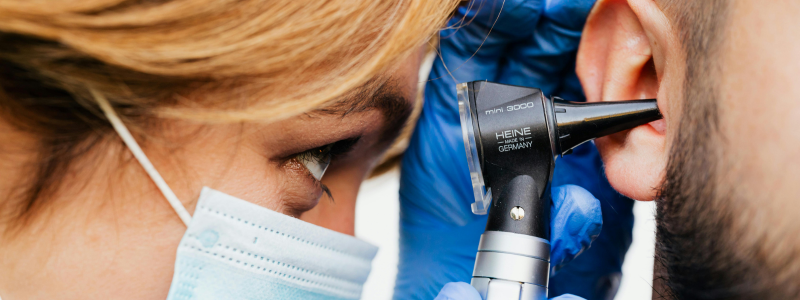
Head of Online Medical Content

Audiology Expert

Keep Missing Doorbells or Alarms?
It might be hearing loss
Overview | Why can't I hear these sounds? | Why you should get your hearing checked | Conclusion
Last Hearing Aid UK Update:
Overview
If you’ve started missing sounds like doorbells, oven timers, or alarm clocks, it might not be a simple distraction—it could be early signs of hearing loss. These high-frequency sounds are often the first to fade in age-related or noise-induced hearing loss.
This article explores why it happens, how it can affect your safety, and what practical steps you can take—like hearing tests, smart technology, and hearing aids—to stay connected and protected.
Keep missing doorbells and alarms?
Have you found yourself lately missing the doorbell, ignoring the oven timer, or sleeping straight through your alarm? It might seem like simple forgetfulness, but it could be something more.
If it's happening more often than not, there’s a chance that you’re not just distracted - you might not be hearing them very well, or not at all.
Consistently missing sounds every day can be an early and subtle sign of hearing loss. It's something many people don’t want to consider, but hearing loss isn't always loud and obvious.
In fact, it can creep in quietly, especially when it comes to high-frequency sounds such as your doorbell, alarm clock, or that oven timer.
This article explores why you might be missing these important sounds, why it’s crucial to get your hearing checked, and what steps you can take to protect your hearing health and stay connected.
The sounds you're missing might be the ones you can't hear
Such sounds are in the high-frequency range, which is often the first area affected in age-related or noise-induced hearing loss. These are among the most common symptoms of hearing loss, and often the easiest to overlook.
While you might hear lower-pitched sounds like conversation or traffic just fine, higher-pitched tones start to fade, and your brain adjusts to accommodate, sometimes without you even realising it.
The result? You’re not hearing the beeps, buzzes or chimes as clearly as you used to. They are now out of your audible range. And because these sounds are designed to be brief and sharp, they’re easier to miss than someone speaking directly to you.
Of course, in a world where we’re glued to screens and surrounded by noise, it's easy to overlook an alert here and there.
However, there’s a difference between occasionally missing a timer and consistently failing to register important sounds. If it’s becoming a pattern, then it’s worth looking into.
Remember, missing key sounds like smoke alarms or emergency alerts can be dangerous. If you notice this pattern, it’s a clear signal to prioritise your hearing health.
Related reading: Age-related hearing loss
It's not only about age
One common myth is that hearing loss is something that only affects people in their 70s and beyond, but the reality is quite different.
Hearing loss can affect people of all ages, and increasingly, it's becoming more common in younger adults due to prolonged exposure to loud environments.
Early signs of hearing loss can start as young as your 30s, especially if you’ve been exposed to loud sounds over time.
You might not notice a gradual decline until practical problems begin to emerge, like a burnt Sunday roast or an annoyed delivery driver who has rung the bell three times.
Even stress and fatigue can contribute to what feels like "selective hearing". When your brain is overwhelmed, it naturally filters out sounds it deems unimportant.
But when that filtering becomes the norm, it might be masking a deeper issue, especially if it always seems to be the same type of sound you’re missing.
Modern lifestyles, such as constant background noise, earbuds at high volume, and long working hours, can also accelerate hearing difficulties. Taking proactive steps now can help protect your hearing long term.
Get your hearing checked – It’s quick, free, and worth it
If any of this is familiar, it might be time to consider a hearing test. The good news is that it’s simple, non-invasive, and accessible. Getting a hearing test near you can take just 30 minutes and may be available for free through local audiologists.
An audiologist can help determine whether the issue is related to hearing loss, and if so, how mild or advanced it may be.
In many cases, catching hearing issues early often means you can take simple steps before they impact your life. Early-stage hearing loss doesn’t require major intervention - just some small adjustments that make a big difference.
For example, you might explore doorbells that flash as well as ring, alarms that vibrate, or kitchen timers with lower-pitched sounds. If hearing aids are recommended, today’s options are discreet, smart, and highly customisable, not the clunky devices of years past.
Many hearing aids now come with advanced technology that can amplify these high-frequency sounds specifically, helping you catch those crucial alerts again. Plus, some devices connect wirelessly to your phone or home system for enhanced sound notifications.
Related reading: Home visits with a local audiologist
You're not alone, take the next step
If you do discover that hearing loss is behind your missed alarms and doorbells, it’s important to remember you’re far from alone.
Around one in six people in the UK lives with some form of hearing loss. It’s not a failure or a flaw; it’s simply something to be managed, just like poor eyesight.
Taking action not only improves your day-to-day life, but it can also prevent further complications down the line.
Studies show that untreated hearing loss can lead to isolation, fatigue, and even cognitive strain, as your brain works harder to fill in the gaps. Getting support early helps you stay connected and in control.
With the right support and technology, you can regain confidence and enjoy life’s important sounds again. Don’t hesitate to reach out to our hearing professionals today.
Key takeaways
✔️ Missing doorbells and alarms could signal high-frequency hearing loss. These high-pitched sounds are often the first to fade in age-related or noise-induced hearing loss - it's not just distraction or forgetfulness if it's happening consistently.
✔️ Your brain adjusts without you realising it. While you might hear lower-pitched sounds like conversation just fine, higher-pitched tones quietly fade, and your brain compensates, sometimes making it difficult to notice the gradual change until practical problems emerge.
✔️ This isn't just an age issue - it affects younger people too. Hearing loss can start as early as your 30s, especially with prolonged exposure to loud environments, and modern lifestyles (constant background noise, earbuds at high volume) can accelerate hearing difficulties.
✔️ Missing crucial sounds is a safety concern. Failing to hear smoke alarms, emergency alerts, or oven timers can be dangerous - if this is becoming a pattern, it's a clear signal to prioritise your hearing health.
✔️ Early detection means simpler solutions. Catching hearing issues early often means small adjustments make a big difference - modern hearing aids can amplify high-frequency sounds specifically, and smart technology options like visual doorbells or vibrating alarms can help.
✔️ Untreated hearing loss has wider consequences. Studies show it can lead to isolation, fatigue, and cognitive strain as your brain works harder to fill in the gaps - getting support early helps you stay connected, safe, and in control of your daily life.
Summary
Regularly missing everyday sounds, such as alarms or doorbells, could point to high-frequency hearing loss, which often develops gradually and goes unnoticed. It's not just an age issue—noise exposure, stress, and lifestyle can also play a role.
A simple hearing test can identify any issues early on, and modern hearing aids or alert systems can help you stay safe and independent. Taking action now can make a big difference to your quality of life.
Why Choose Us?
- FREE Hearing Tests
- Best Hearing Aids and Prices
- FREE Aftercare for Life
- FREE Home Visits
- 200+ Local Audiologists
- 60 Day Money Back Guarantee
Missing the sound of doorbells and alarms?
You might have hearing loss
If you’re regularly missing doorbells, alarms, or timers, don’t just put it down as forgetfulness. Take a moment to consider what your ears might be trying to tell you.
It’s important to pay attention to these everyday signs because they could indicate the early stages of hearing loss.
Detecting hearing changes early means you can address them before they impact your safety and quality of life.
Other hearing loss awareness articles you might like...
 Hearing aid stigma
Hearing aid stigma  How to tell if hearing loss is permanent or temporary
How to tell if hearing loss is permanent or temporary  Ways to keep your ears healthy
Ways to keep your ears healthy Our specialist service includes:
Do not spend hundreds of pounds without getting a second opinion from us.
Please call us on 0800 567 7621
 Not only are the prices great, but the service is fantastic! Many thanks to your team.
Not only are the prices great, but the service is fantastic! Many thanks to your team.What's included in our hearing aid prices?
Other pages you might find useful
FAQs
In general, any audiologist will always recommend to you the hearing aid model that best suits your needs. Here is a useful checklist to make sure that is the case.
- Audiologist's level of knowledge: The audiologist you have seen will hopefully have a wide knowledge of all available hearing aids; however, some will only be familiar with a small number of brands and, therefore, may not really be in a position to know which model is the best for you. It is OK to challenge their recommendation and ask them to justify why this particular brand is the one for you.
- Do research: Read about the hearing aid that was recommended. Does it seem like it will suit your lifestyle? Does it have more or fewer features than you need?
- Be aware of sales targets: Many high street retailers have specific tie-ins to a particular manufacturer/brand. The hearing aid they have suggested may still be the correct one for you, but do your research so that you know why they might have recommended it.
If you have significant hearing loss in both ears, you should be wearing two hearing aids. Here are the audiological reasons why:
Localisation: The brain decodes information from both ears and compares and contrasts them. By analysing the minuscule time delays as well as the difference in the loudness of each sound reaching the ears, the person is able to accurately locate a sound source.
Simply put, if you have better hearing on one side than the other, you can't accurately tell what direction sounds are coming from.
Less amplification is required: A phenomenon known as “binaural summation” means that the hearing aids can be set at a lower and more natural volume setting than if you wore only one hearing aid.
Head shadow effect: High frequencies, the part of your hearing that gives clarity and meaning to speech sounds, cannot bend around your head. Only low frequencies can. Therefore, if someone is talking on your unaided side, you are likely to hear that they are speaking, but be unable to tell what they have said.
Noise reduction: The brain has its own built-in noise reduction, which is only really effective when it is receiving information from both ears. If only one ear is aided, even with the best hearing aid in the world, it will be difficult for you to hear in background noise as your brain is trying to retain all of the sounds (including background noise) rather than filtering them out.
Sound quality: We are designed to hear in stereo. Only hearing from one side sounds a lot less natural to us.
Fancy some further reading on this topic? You can read about why two hearing aids are better than one in our article, hearing aids for Both Ears, here
For most people, the main benefit of a rechargeable hearing aid is simple convenience. We are used to plugging in our phones and other devices overnight for them to charge up. Here are some other pros and cons:
For anybody with poor dexterity or issues with their fingers, having a rechargeable aid makes a huge difference, as normal hearing aid batteries are quite small and some people find them fiddly to change.
One downside is that if you forget to charge your hearing aid, then it is a problem that can't be instantly fixed. For most, a 30-minute charge will get you at least two or three hours of hearing, but if you are the type of person who is likely to forget to plug them in regularly, then you're probably better off with standard batteries.
Rechargeable aids are also a little bit bigger and are only available in Behind-the-Ear models.
Finally, just like with a mobile phone, the amount of charge you get on day one is not going to be the same as you get a few years down the line. Be sure to ask what the policy is with the manufacturer's warranty when it comes to replacing the battery.
For most people, the answer is yes. But it's never that simple.
The majority of hearing problems affect the high frequencies a lot more than the low ones. Therefore, open fitting hearing aids sound a lot more natural and ones that block your ears up can make your own voice sound like you are talking with your head in a bucket. Therefore, in-ear aids tend to be less natural.
However, the true answer is we can't tell until we have had a look in your ears to assess the size of your ear canal, and until we have tested your hearing to see which frequencies are being affected.
People with wider ear canals tend to have more flexibility, also there are open fitting modular CIC hearing aids now that do not block your ears.
There is also the age-old rule to consider, that a hearing aid will not help you if it's sat in the drawer gathering dust. If the only hearing aid you would be happy wearing is one that people can't see, then that's what you should get.
Most people can adapt to any type of hearing aid, as long as they know what to expect. Have an honest conversation with your audiologist as to what your needs are.
Generally speaking, six or more. Unless it's none at all. The number of channels a hearing aid has is often a simplistic way an audiologist will use to explain why one hearing aid is better than another, but channels are complex, and it is really not that straightforward. Here are some reasons why:
Hearing aids amplify sounds of different frequencies by different amounts. Most people have lost more high frequencies than low, and therefore need more amplification in the high frequencies. The range of sounds you hear is split into frequency bands or channels, and the hearing aids are set to provide the right amount of hearing at each frequency level.
Less than six channels, and this cannot be done with much accuracy, so six is the magic number. However, a six-channel aid is typically very basic with few other features and is suitable only for hearing a single speaker in a quiet room. The number of channels is not what you should be looking at; it's more the rest of the technology that comes with them.
As a final note, different manufacturers have different approaches. One method is not necessarily better than any other. For example, some manufacturers have as many as 64 channels in their top aids. Most tend to have between 17 and 20. One manufacturer has no channels at all.
Manufacturer's warranties typically last between 2-5 years, depending on the brand and model, and cover defects in materials and workmanship. This includes repairs for component failures, electronic malfunctions, and manufacturing defects, but excludes damage from misuse, accidents, or normal wear. Most manufacturers also include loss and damage insurance for the first year.
We handle all warranty claims on your behalf, liaising with manufacturers and ensuring you get replacement devices quickly when needed. This comprehensive warranty coverage, combined with our lifetime aftercare, gives you complete peace of mind.
Our hearing tests are completely free, whether at our clinics or in your home. Unlike other providers who charge £30-£100 for home visits, we believe hearing healthcare should be accessible without financial barriers. Our comprehensive assessments include examination by a registered audiologist, audiogram results, and personalised recommendations.
All testing, future adjustments, and ongoing support are included at no extra cost. While NHS tests are also free, typical 6-week waiting periods often lead people to seek immediate private testing. We provide prompt, professional assessments that fit your schedule and budget.
Yes, we offer completely free home visits throughout the UK, and this service is included in our prices with no additional charges. Home visits are particularly valuable for people with mobility issues, busy schedules, or those who simply prefer the comfort and convenience of their own environment.
Our audiologists can conduct full hearing tests, fit hearing aids, and provide ongoing support in your home. This service sets us apart from many providers who either don't offer home visits or charge extra for them.
We can offer prices up to 40% lower than high street retailers because of our business model. As a network of 200+ independent audiologists, we don't have the massive overheads of large retail chains - no expensive high street premises, no sales targets pushing audiologists to sell the most expensive options, and no costly marketing campaigns.
However, we maintain the same buying power as the big chains because we purchase on behalf of our entire nationwide network. This means you get access to the same premium hearing aids with professional service, but at genuinely competitive prices.
We offer a comprehensive 60-day money-back guarantee, which gives you twice the industry standard time to properly assess whether your hearing aids are right for you. This extended period recognises that adjusting to hearing aids takes time, and your brain needs several weeks to adapt to the amplified sounds.
Unlike many providers who offer just 30 days, we believe 60 days gives you the confidence to test your hearing aids in all the situations that matter to you - from quiet conversations at home to busy restaurants and outdoor activities.
Ask the Experts
6 Morton Lane
Walkwood
Redditch
Worcestershire
B97 5QA
Latest Launch
When we refer to a product as 'Latest Launch', we mean it is the latest to be released on the market.
New
When we refer to a product as 'New', we mean that the product is the newest hearing aid model on the market.
When we refer to a product as 'Superseded', we mean that there is a newer range available which replaces and improves on this product.
Older Model
When we refer to a product as an 'Older Model', we mean that it is has been superseded by at least two more recent hearing aid ranges.
